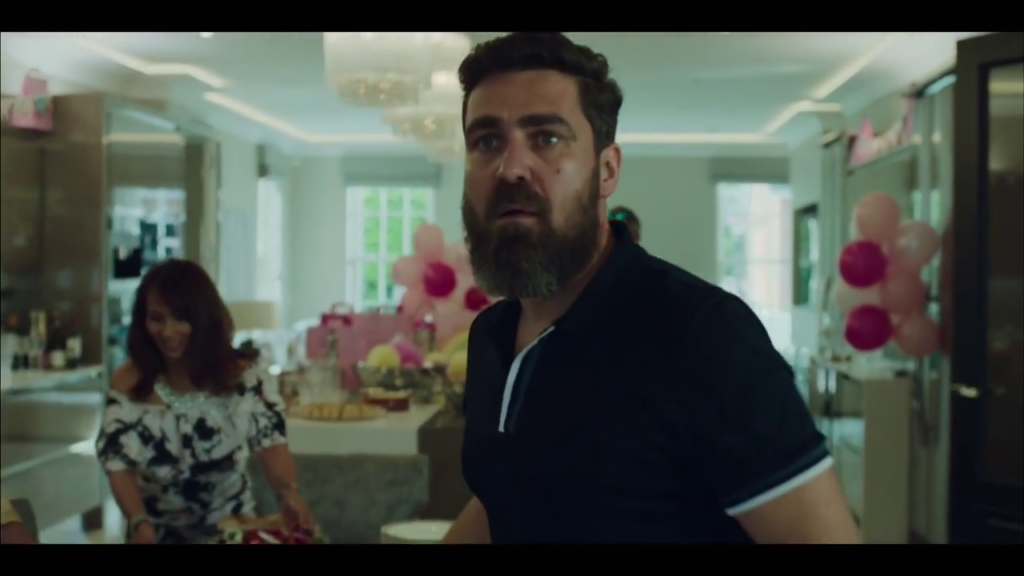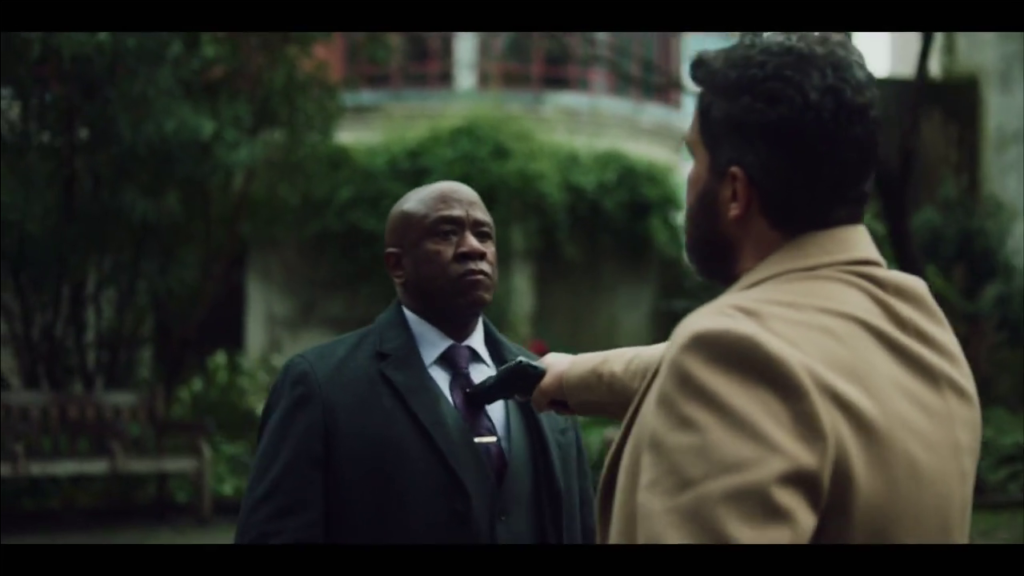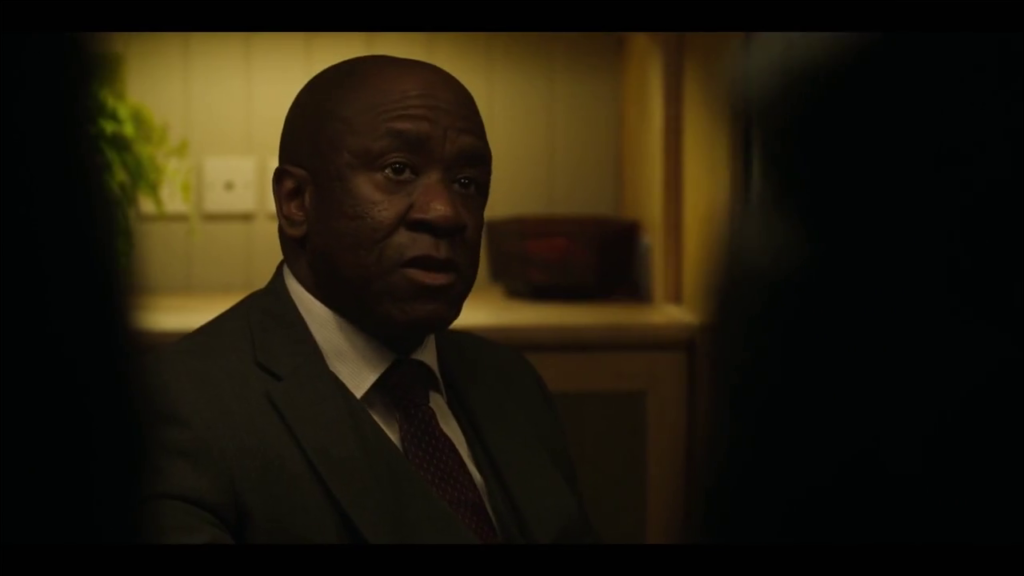Gangs of London
Season 1
Episode 7
Many hands make light work
The last time I watched Gangs of London’s first season all the way through was in the spring of 2020, fully four years ago now, but my memory of the show up to this point has, I think, been pretty sharp.
Even if I didn’t remember the convolutions of the plot in exact, specific detail, I remembered the broad strokes of each episode, and the arc they traced towards the season’s climax.
Until Episode 7. This was the episode when, loading it up, I struggled to think of any scene or character beat that I associate with it. Watching it with fresh eyes now, it made sense why; this is probably the most baldly functional and utilitarian installment in the whole 9-episode run. Director Xavier Gens and writer Peter Berry advance all of the in-progress plotlines with blunt expediency and a conspicuous lack of showmanship. It’s like they’re playing catch-up, after Episodes 5 and 6 both narrowed their scope.
Director Xavier Gens and writer Peter Berry advance all of the in-progress plotlines with blunt expediency and a conspicuous lack of showmanship.
That impression particularly makes itself felt early in the episode, when Asif launches an assault on the Kurdish faction’s headquarters. The scene is set up with the same kind of foreboding and mounting tension that the audience for this show has been trained to associate with the run-up to a big action set piece. We start from a bird’s-eye shot, high above the warehouse where Lale commands her distribution operation. The camera is overlaid with a filter, displaying all sorts of target-acquisition graphics, reminiscent of the drone-bombardment missions in a Modern Warfare game.
From there, we cut to Asif and his lieutenants sitting in a darkly lit boardroom, issuing instructions to their strike team. (Asif Raza Mir’s facial acting in this sequence is great: his eyes are anticipatory and cruel and gleeful, like a coiled snake.) We cut to the strike team as they surround the warehouse, balaclava-wearing thugs brandishing automatic weapons penetrating the Kurd’s defences with surgical, co-ordinated precision…

…And then, the massacre of Lale’s followers plays out offscreen. We get a handful of insert shots of Kurdish defenders being blown away, but the rest is left up to implication; the sound editing superimposes the noise of carnage over Asif’s satiated expression.
It’s noticeably underwhelming, and a stark contrast to the season’s first five episodes. With Evans or Hardy directing, I’d have expected this sequence to be a centrepiece. Here in Episode 7, it’s glossed over; a plot beat in a bullet-point summary of plot beats, rather than an opportunity for spectacle. I don’t want to keep banging the “Where’s the action!?” drum, but seriously. This feels like watching an old movie that’s been imperfectly restored, and has critical footage missing.
Lale, thankfully, survives the attack, and crawls her way out from under the corpses of her comrades-in-arms before either Asif or Sean can comb through the wreckage.
Meanwhile, Luan is in trouble. The account that was meant to pay him for doing Finn’s dirty work has been remotely emptied; there was a timed transfer in the Wallace organisation’s system, set up to drain the half-billion Finn owed before Luan could claim it. Now, Mosi has come to London, looking to extract Luan’s debt. Two of the best scenes in Episode 7 involve Mosi (Richard Pepple still projecting astonishing levels of menace in the part). The first, when he shows up on the doorstep of Adige Investment House. He and his heavies stalk through the corridors and systematically dismember the employees, cutting off their hands at the wrists (“the punishment of a thief,” Luan observes).

Two of the best scenes in Episode 7 involve Mosi (Richard Pepple still projecting astonishing levels of menace in the part).
The second, shortly afterward, comes when he shows up at Luan’s house, during the lavish birthday party being thrown for Luan’s young daughter, Bukoroshe (Chloe Sulaj). Luan’s eyeline match when he sees Mosi and his minions striding into his garden is something close to a jump-scare. (I like Orli Shuka as Luan, but he perhaps leans too hard on emphasising the Albanian gang boss’s vulnerability. I feel like Luan would benefit from being a notch tougher next to Mosi; just a bit less emotionally transparent.) The Seven-esque moment when Mosi presents Bukoroshe with a gift-wrapped parcel is inspired; we see Luan’s horrified reaction shot, anticipating the worst… before Mosi’s gift to his daughter is a perfectly delightful terrier puppy.
We, the audience, recognise the dog as “Zeus”; the same dog owned by the pleading banker whose hand Mosi just chopped off minutes earlier. It’s a delightfully morbid grace note, and Luan’s expression of hatred and disgust makes it clear that he knows his time is up. He has to rebuild his finances, or he’s due for a fate that will be bad, even by Gangs of London standards.
Also meanwhile, Elliot’s busily squirrelling away behind the scenes. He links up with Vicky, and gives her the intel on Tove’s house which he and Sean investigated in the previous episode. The police raid the house… only to turn up nothing,the site systematically scrubbed of evidence before they arrived. The Investors – the same people who hired Leif and Tove – have their tendrils in London’s police, and they’ve assigned a man to watch Elliot. They’ve discovered his relationship with Shannon Dumani.
Also, also meanwhile, Marian has taken a trip to Ireland, reconnecting with her old contacts in the IRA from before she shacked up with Finn. She offers the yacht Finn bought, christened Floriana, in exchange for her one-time allies’ services as a private army.
Also, also, also meanwhile, Ed meets with Jevan, now established as the Mouth of Sauron for the Investors.

If the preceding paragraphs read like a list of events that happen in Episode 7, without any insight into how they intertwine or complement each other… well, reader, you win the jackpot, because that’s kind of how the episode itself plays out. Never mind the outliers of Episodes 1 and 5; this really made me miss the halcyon days of Episodes 3 and 4. Gangs of London has always needed to keep a lot of plates spinning at once; remaining attentive to well over a dozen key characters. The artistry of the first half of the season was in the ways it found for those agendas to dovetail and converge. Episode 4, in particular, was ingenious in the ways it found for its various characters to intersect and clash, in ways that led up to a climactic, dramatic crescendo within its apportioned hour of TV.
If the preceding paragraphs read like a list of events that happen in Episode 7, without any insight into how they intertwine or complement each other… well, reader, you win the jackpot.
Episode 7, by comparison, doesn’t feel like it’s meaningfully converging towards a point; it just feels like a bunch of stuff, happening in parallel. I’ve heard critiques of long-form, serialised TV shows as being 2-hour movies, cynically stretched out to 10 hours. I only partly agree with that assessment of the medium – I think long-form TV can sometimes do things that films can’t, if it’s well-orchestrated – but Episode 7 of Gangs of London is the sort of thing those critiques are thinking of. Taken on its own, it’s a slow, lugubrious chore to watch; mortgaging its viewers’ satisfaction on material yet to come; redeemed mainly by a terrific ensemble cast and handsome cinematography.
And the score. I think this episode was the first time I really appreciated how crucial the music by Aria Prayogi and Fajar Yuskemal is to this series; their shivering strings and pulsating, swelling minor-key figures give an underlying tension and thrust to scenes that would otherwise feel disconnected and diffuse.
And, credit where credit’s due: Episode 7’s climax makes up for a lot.

Jevan gives Ed and Alex an ultimatum in the wake of Mosi’s all-too-public atrocity; they have to get their house in order. By the end of the evening, Alex has to be in control of the Wallace enterprise… or none of them will be. The Dumanis arrange to meet with the Wallaces, and come clean. They know this is going to be bad; it’s just a question of how bad it will be.
The confrontation at the Wallace’s townhouse – Alex and Ed on one side of the dining table; Marian and Sean on the other; Billy and Elliot and Shannon trapped in a kind of limbo in-between – is a rare moment where Gangs of London succeeds purely as drama, without any ultraviolence to catalyse it. Ed and Alex lay out the facts, knowing just how bad a light the facts paint them in. They’ve known all along that the Investors killed Finn, and want Sean out of the way as well; that Finn was embezzling funds from the Wallace organisation to run away and start a new life with Floriana; that even before his assassination, he’d put plans in place to leave Alex – the level-headed son, who’s good with numbers – in control of the family business.
They spin the events as best they can, but Sean and Marian, both angry and betrayed, come to the same conclusion: Ed and Alex are staging a coup, attempting to steal their family’s business out from beneath their feet. Sean snaps, and shoots Ed (non-lethally) in the leg, chasing him and his children out of his home, forever, at gunpoint.
It’s a big, brassy, operatic scene, the emotions at play not subtle in the slightest, but it plays to Gangs of London’s strengths with the sheer, vitriolic force of the performances. I have my problems with Joe Cole’s portrayal of Sean Wallace (I’ll get to those in Episode 8), but here, his snarling, spittle-flecked apoplexy at the Dumanis feels proportionate. “You fucking Judas CUNT!” he screams at Alex, and for once, the show’s deployment of the c-word feels earned in its emotional intensity. “If I ever see you again, I’ll kill you! Now take your scumbag father away.”
It’s a big, brassy, operatic scene, the emotions at play not subtle in the slightest, but it plays to Gangs of London’s strengths with the sheer, vitriolic force of the performances.

There’s been the hope since Episode 1 that the Wallaces and the Dumanis might find a way to reconcile; now, at last, the schism seems truly, terribly permanent. The cherry on top, once Ed and Alex have limped out the front door, is that Sean forbids Elliot from seeing Shannon ever again. His anger spent, the Wallace heir-apparent collapses, weeping, in his Mum’s arms, devastated by the idea Ed left him with: that he wasn’t, and now never will be, good enough to fill his father’s shoes.
It’s a heady brew of rage and pain and trauma, played in the loudest, boldest strokes possible. And yet, I think that Gangs of London’s seventh episode undermines itself, leaving a crucial dramaturgical device on the table. The episode begins with a flashback to a covert meeting between Ed and Finn: the last time the two old friends saw each other before Finn’s assassination. Finn confesses to Ed his plans to run away with Floriana, leaving his family and his company in the lurch.
During the confrontation over the dinner table, Sean and Marian persuade themselves that Ed is lying; that they’re manufacturing a false narrative about Finn’s betrayal, to service their own takeover of the Wallace organisation. Are Sean and Marian deluding themselves; or is there the possibility that their suspicions are well-founded, and that Ed and Alex are actually lying, crying crocodile tears in their bid for power?
Well… no, it turns out. Ed’s account of Finn’s betrayal is authentic; the viewer saw it for themself in the opening scene. Any potential ambiguity is nipped in the bud; Sean is simply, objectively wrong when he jumps to the conclusion that the Dumanis are defrauding Finn’s memory, and that places a distance between the audience and his violent reaction. The script attunes the audience to the facts of the plot, to be understood empirically; not to the subjective experience of the characters living it. That bluntness and literalism manifests in the second half of Gangs of London’s first season, in more ways than just the lack of fight scenes.
- Review Series: Gareth Evans
- Review Series: Gangs of London
Is It Good?
Nearly Good (4/8)
More Gangs of London reviews
Andrew is a 2012 graduate of the University of Dundee, with an MA in English and Politics. He spent a lot of time at Uni watching decadently nerdy movies with his pals, and decided that would be his identity moving forward. He awards an extra point on The Goods ranking scale to any film featuring robots or martial arts. He also dabbles in writing fiction, which is assuredly lousy with robots and martial arts.


4 replies on “Gangs of London, Season 1, Episode 7”
These writings have been excellent recaps of ‘GoL’. I didn’t realize how much I was missing until I found this site. You put a lot of time and effort into writing these, and we really appreciate your efforts. Thank you..
–John
Colorado
Good of you to say, John, thanks! I did try to give these my best effort.
I dont know Why I never watched this show before now! Hubby & I are Locked in!
I really loke your Recap/ review!
It’s thorough & brings up good points i missed.
Onto next episode!
Glad you got something out of it, Darlene! Hope you and the hubby enjoy the show to come.